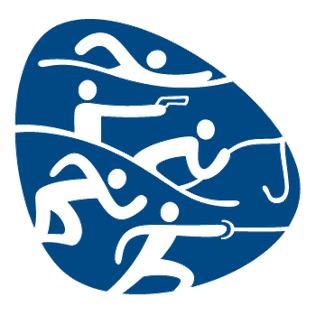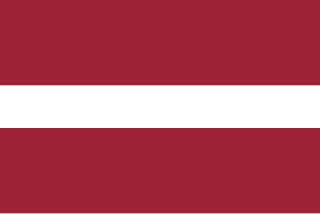
The modern pentathlon is an Olympic multisport that currently consists of fencing, freestyle swimming, equestrian show jumping, laser pistol shooting, and cross country running. Equestrian will be replaced by a form of obstacle course racing at the 2028 Summer Olympics.

The International Modern Pentathlon Union, commonly known by the acronym UIPM, has been the international governing body of modern pentathlon since its foundation in London in 1948. Its headquarters are in Monaco and it has 115 national federation members in 2018 and 133 members in 2024. Modern pentathlon was introduced at the fifth Olympiad in Stockholm, Sweden, in 1912, comprising the contemporary sports of pistol shooting, fencing, swimming, horse riding and running, which embraced the spirit of its ancient counterpart.

The modern pentathlon at the 2012 Summer Olympics in London was held from 11 to 12 August 2012. The men's and women's events each involved 36 athletes. The venues for the events were the Copper Box (fencing), the Aquatics Centre (swimming), and Greenwich Park.

The modern pentathlon at the 2016 Summer Olympics in Rio de Janeiro took place from 19 to 20 August 2016 at Deodoro Aquatics Centre, Deodoro Stadium, and Youth Arena.

Aleksander Leonidovich Lesun is a Belarusian-born naturalized Russian modern pentathlete. He is a multiple-time medalist at the World and European Championships, and was a top-ranked male modern pentathlete in the world by the Union Internationale de Pentathlon Moderne (UIPM).
Leila Gyenesei is a Hungarian modern pentathlete and cross-country skier. She is a five-time medalist at the World Championships, and is currently ranked no. 19 in the world by the Union Internationale de Pentathlon Moderne (UIPM). She is also the daughter of István Gyenesei, former Minister of Local Government and chairman of the Association for Somogy party.

The modern pentathlon at the 2020 Summer Olympics in Tokyo took place in 2021 at Musashino Forest Sport Plaza and Ajinomoto Stadium.

Belarus competed at the 2016 Summer Olympics in Rio de Janeiro, Brazil, from 5 to 21 August 2016. It was the nation's sixth consecutive appearance at the Summer Olympics in the post-Soviet era.

Hungary competed at the 2016 Summer Olympics in Rio de Janeiro, Brazil, from 5 to 21 August 2016. Hungarian athletes have appeared in every edition of the Summer Olympic Games, except for two occasions. Hungary was not invited to the 1920 Summer Olympics in Antwerp, because of its role in the first World War, and it was also part of the Soviet boycott, when Los Angeles hosted the 1984 Summer Olympics.

Lithuania competed at the 2016 Summer Olympics in Rio de Janeiro, Brazil, from 5 to 21 August 2016. This was the nation's seventh consecutive appearance at the Games in the post-Soviet era and ninth overall in Summer Olympic history.

Egypt competed at the 2016 Summer Olympics in Rio de Janeiro, Brazil, from 5 to 21 August 2016. Since the nation's debut in 1912, Egyptian athletes had appeared in every edition of the Summer Olympic Games except 1932 and 1980, joining the United States-led boycott in the latter.

Latvia competed at the 2016 Summer Olympics in Rio de Janeiro, Brazil, from 5 to 21 August 2016. This was the nation's seventh consecutive appearance at the Games in the post-Soviet era and eleventh overall in Summer Olympic history.
Katherine Elizabeth French is a British modern pentathlete who won the gold medal at the 2020 Summer Olympics in Tokyo, Japan.
This article details the qualifying phase for modern pentathlon at the 2020 Summer Olympics. Thirty-six athletes per male and female gender must qualify for the Games, with only a maximum of two each per NOC. Qualification methods are similarly applied to both men's and women's events.

Hungary competed at the 2020 Summer Olympics in Tokyo. Originally scheduled to take place from 24 July to 9 August 2020, the Games were postponed to 23 July to 8 August 2021, because of the COVID-19 pandemic. Hungarian athletes have appeared in every edition of the Summer Olympic Games, except for two occasions. Hungary was not invited to the 1920 Summer Olympics in Antwerp, because of its role in the first World War, and was also part of the Soviet boycott, when Los Angeles hosted the 1984 Summer Olympics.

Mexico competed at the 2020 Summer Olympics in Tokyo. Originally scheduled to take place from 24 July to 9 August 2020, the Games were postponed to 23 July to 8 August 2021, because of the COVID-19 pandemic. It was the nation's twenty-fourth appearance at the Summer Olympics. Athletes were given priority for vaccines in March.

Egypt competed at the 2020 Summer Olympics in Tokyo. Originally scheduled to take place during the summer of 2020, the Games were postponed to 23 July to 8 August 2021, because of the COVID-19 pandemic. Since the nation's debut in 1912, Egyptian athletes have appeared in every edition of the Summer Olympic Games except 1932 and 1980, joining the United States-led boycott in the latter.

Latvia competed at the 2020 Summer Olympics in Tokyo. Originally scheduled to take place from 24 July to 9 August 2020, the Games were postponed to 23 July to 8 August 2021, because of the COVID-19 pandemic. It was the nation's eighth consecutive appearance at the Games and twelfth overall in Summer Olympic history.

The modern pentathlon at the 2024 Summer Olympics in Paris took place during 8 to 11 August 2024 at the Palace of Versailles and the Arena Paris Nord. The Palace of Versailles hosted all the modern pentathlon events, with the only exclusion being the fencing ranking rounds, which occurred at the North Paris Arena. Two events were contested, one for men and another for women.
This article details the qualifying phase for modern pentathlon at the 2024 Summer Olympics. Thirty-six athletes for each gender must qualify for the Games, with only a maximum of two each per NOC. Qualification methods are similarly applied to both men's and women's events.















